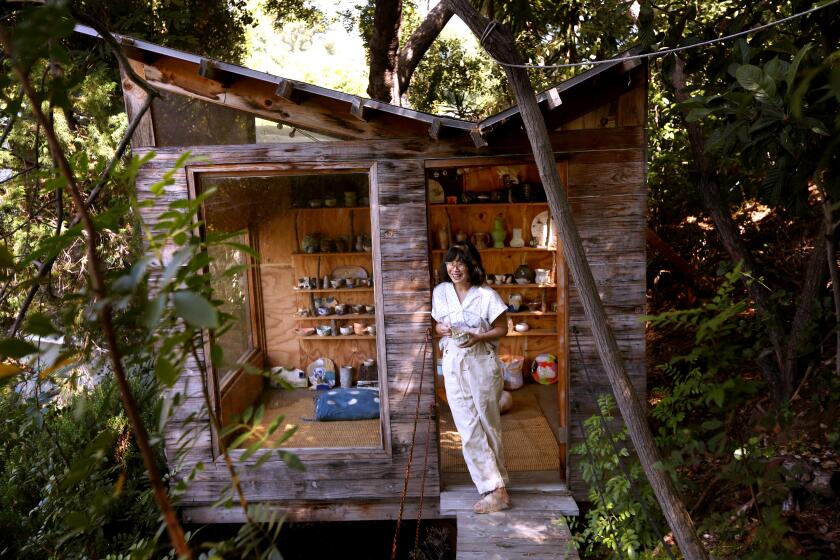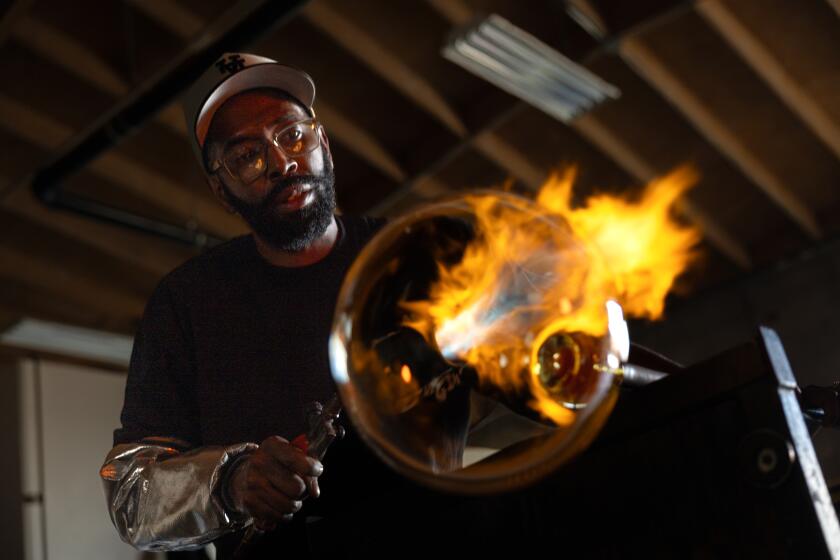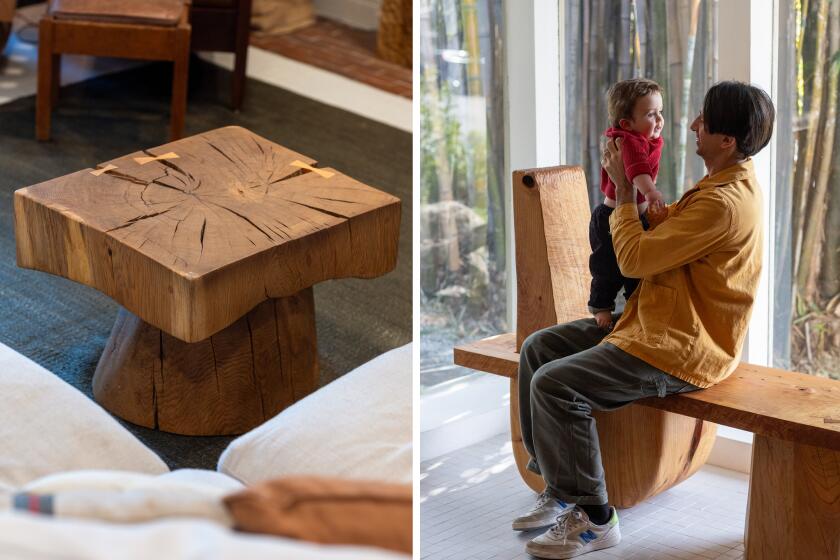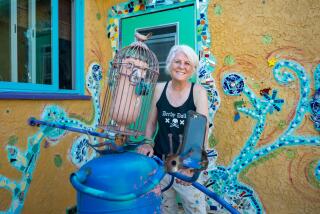
• His passion for guitars led him to a job at Tom Anderson Guitarworks; after setting out on his own, he crafts functional and aesthetically beautiful guitar stands that he considers furniture.
Stepping into woodworker Eric Blackwell’s Woodland Hills home, you feel as if you’re entering a bespoke furniture boutique. That’s because much of the decor was handmade by Blackwell after he and his wife, Jee, bought their house in 2012.
You’ll find a walnut wood butcher-block island in the kitchen measuring 5-by-5 feet, made of 1,500 pieces, along with cutting boards made from upcycled maple guitar necks, a reclaimed walnut credenza in the living room and handmade wooden light switch covers in the bathroom.
Although these pieces remain exclusive to the Blackwell household, customers know 43-year-old Blackwell, who’s from Anaheim, for his handcrafted artwork made largely from reclaimed guitar wood.
In our L.A. Crafted series, we highlight independent makers and artists, from glassblowers to fiber artists, who are creating and producing original products in Los Angeles.
Discussing his work and process, Blackwell jokingly describes himself as having an “unfortunate disease” of making things. His creations range from guitar stands priced at $179 to mid-century-style clocks starting at $300 and pieces of large marquetry — an art form involving inlaid work made from small pieces of variously colored wood or other materials — priced at $1,800.
Despite only transitioning to his full-time artistry from his job as a guitar-builder less than two years ago, Blackwell is already making a name for himself thanks to his work, which is featured in California boutiques like Trina Turk and the Frank Lloyd Wright Foundation store. You can also find his art on the Blackwell Woodworks website.
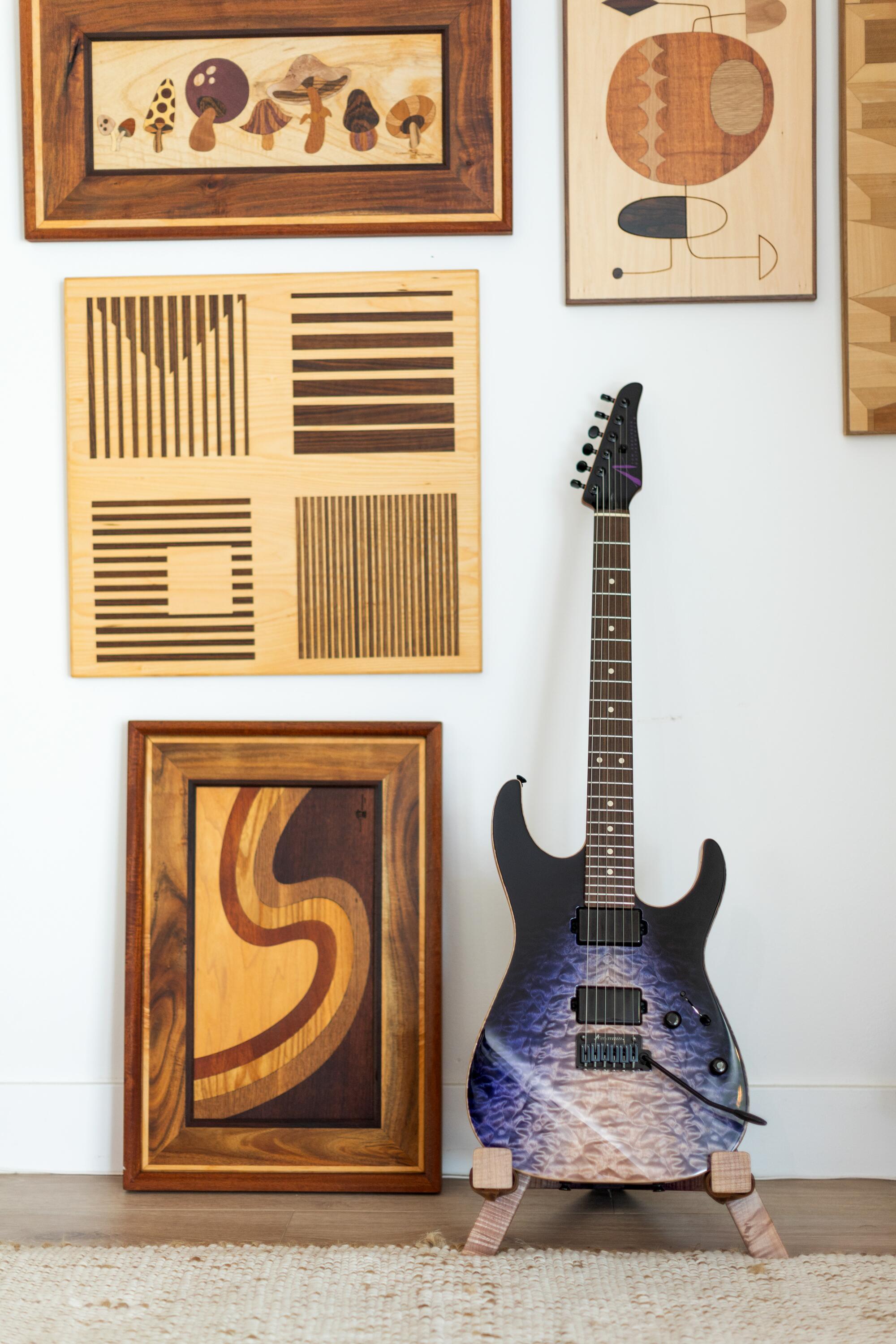
It might be hard to believe that this meticulous woodworker, sculpting delicate art pieces in his home studio, was once a rocker swinging his guitar around on stage in high school.
After Blackwell graduated from Moorpark High School, his passion for guitars led him to Tom Anderson Guitarworks, a guitar-building workshop in Newbury Park, in 2001. Since then, woodworking has been an integral part of his life.
Grace Xue / Los Angeles Times
“I was surrounded by big machines, cool tools and huge boards of lumber used for guitar building,” he says. “If there were leftover pieces, we’d stack them up and burn them as firewood. So I started collecting these small pieces of mahogany, rosewood and maple, and you scratch your head and realize, ‘Oh, can I make something with this?’ ”
Growing up, Blackwell would often visit his grandfather’s Buena Park home, which was decorated with an eclectic collection of thrifted clocks. Despite losing his thumbs and fingers from a house fire when he was very young, Blackwell’s grandfather ingeniously adapted his work tools and became the head of maintenance for the local school district. Blackwell would help him with various projects.
Fittingly, Blackwell’s first piece created from the wood scraps at work was a clock for his grandfather. A trapezoid design in mid-century and Art Deco styles, it was met with surprise and pride: “Eric, this is a $50 clock,” his grandfather told him.
The home of ceramist Raina Lee includes a tree house featuring her pottery as well as a garage studio that houses her pottery wheel, kilns and her crackly volcanic glazes.
“In his mind, that was really expensive,” Blackwell says. “He would never spend $50 on a clock.”

This experience sparked a wellspring of inspiration for Blackwell. In his spare time at Tom Anderson, where he was able to use machines he didn’t have at home at the time, he developed more clock designs, maintaining a consistent mid-century aesthetic with quirky shapes such as pyramids, avocados, eyes, stadiums and televisions.
“I’m attracted to the futuristic feel from the past,” he says. “When you think about the ’50s and the ’60s, when we were inventing all these new things, there’s a piece of American history in there.”
Blackwell also began exploring the art of marquetry, creating works that often feature inlaid patterns of trees, mushrooms and geometric shapes.

Among the creations he’s most proud of are his guitar stands. As a guitarist, Blackwell understands the value musicians place on their instruments. Typical guitar stands on the market today are “ugly and cheap-looking” items made of metal or plastic, he said. He aims to design aesthetically pleasing stands that musicians can use to display their guitars with pride.
After numerous drafts and countless adjustments for angles and weight distribution, Blackwell developed two designs, for electric and acoustic guitars. The stands consist of two triangular hardwood structures that clip together through magnets, with naturally tanned leather attachments for the guitars to rest on.
“I feel like everything functional should also be artistic,” he says. “You can rest your guitar on anything, but why not put it on a nice piece of furniture?”

In March 2023, Blackwell transitioned to full-time artistry, launching his brand Blackwell Woodworks so he could dedicate himself to new designs and customized pieces for his clients.
For Tom Anderson, founder of Tom Anderson Guitarworks, who’s been a mentor and “second father” to Blackwell for 22 years, watching him go from a beginner to a skillful craftsman isn’t a surprise.
“Through his time [at Tom Anderson], you could tell he always had his idea of doing something creative in the back of his mind,” Anderson says. “We both knew when it was time, you know, for him to head out on his own.”
Los Angeles glassblower Cedric Mitchell relishes his role as a rulebreaker. “I wanted to break all the design rules similar to Ettore Sottsass,” he says, “and develop my own style.”
With a family of four — Jee, 46, a hairdresser, and their two sons, Owen, 14, and Allen, 12 — Blackwell was initially concerned about whether a full-time art career could sustain their household. He gave himself a one-year deadline to figure out if it could work; if not, he‘d return to building guitars.
“Obviously, that never ended up happening,” Jee Blackwell says. “It’s still scary thinking about where things will go, but no matter what, he keeps chipping away at it. And the business keeps growing little by little.”
Working from his home studio, Blackwell has more time and space to develop larger works. As a SoCal bonus, the stable and dry climate in Los Angeles is ideal for woodworking all year. And Blackwell can easily spend weeks meticulously cutting, staining and arranging small geometric tiles into a 24-by-40-inch wall art piece.

Friends described him as a nerdy perfectionist.
“As long as I’ve known Eric, he always has something that he’s all about,” says Ken Anderson, a business development manager at a biotech company who has been a close friend with Blackwell for 20 years. “And when he’s all about something, he’s learning it and becoming a master.”
Ken Anderson recalls Blackwell’s diverse interests, from golf and guitar to poker and pool shooting. Blackwell also built a large home brewery a few years ago.
His interests aside, Blackwell is fully devoted to his woodwork. “This is what I do to relax,” he says. “I love taking on a new project and then figuring out how to do it.”
Jee Blackwell often reminds her husband to take breaks from his work. “We’ll make sure like, ‘Alright, go get Dad. He has to eat,’ ” she says. “Otherwise I don’t even know if he’ll eat.”
Krysta Grasso’s vibrant crochet brand, Unlikely Fox, is dedicated to her late mother, who taught her to crochet when she was 5.
Only his sons’ baseball games can pull him away from his work. Blackwell coaches Owen and Allen’s teams and never misses a game. In his studio, two magnets on a cabinet display pictures of the boys in their baseball uniforms.
“He’s a great dad,” says Tom Anderson, adding that Blackwell always made sure to take vacations with his family when he was at Tom Anderson. “I remember when I started my business, I was working all the time, but I think he hits a good balance.”
Blackwell’s sons sometimes help out in the studio, sweeping up wood dust and sanding boards. Blackwell encourages their creativity and guides them in making small woodwork projects. Last Christmas, Owen made wooden key chains with engraved initials for each family member.
What helps Blackwell stay refreshed and organized is a fixed morning routine. He wakes up at 6 a.m., makes coffee and takes a half-hour walk around his neighborhood, where he enjoys seeing bunnies and hearing birds sing.
“One thing I learned from all that walking is to not bring any earpiece to listen to music or podcasts,” he says. “Just be bored. Don’t plug up your senses where you can’t hear what’s going on around you.”
After his walk, he rides his mountain bike on the Las Virgenes View Trail for an hour. Bike-time, he says, is for concentrating, planning his day and problem-solving.

Beyond his morning routine, Blackwell cites friendships as his “secret weapon” for his creative process.
Robert LeJeune, from Echo Park, is one of his frequent callers. Their friendship started when Blackwell offered him home-brewed beer after LeJeune built fencing for his house. With a background in engineering and sales, LeJeune was a key source of information when Blackwell started running his own shop.
“Eric is not shy to ask for advice from many people, and I just happened to be one of his trusted advisers,” LeJeune says. “It’s always a friendly call. It’s not always just about business.”
Vince Skelly, a Claremont designer, transforms raw timber into decorative and functional works of art. He starts with a chainsaw and transitions to other tools to add nuance.
As a big supporter of Blackwell’s work, LeJeune often tries to purchase his products but rarely succeeds in paying for them.
“If I try to order anything, he would return my money and bring me whatever I ordered,” says LeJeune, who has three clocks and two guitar stands from Blackwell Woodworks.

Completing a piece is not the end for Blackwell. He often asks clients to send photos of his work in their homes so he can revisit his art.
“They are his babies,” LeJeune says. “He is a true artist at heart.”
Blackwell says he’s glad to see a resurgence in the appreciation for handmade items. He’s looking forward to attending Modernism Week, an exhibition of midcentury architecture and design, in Palm Springs from Thursday through Sunday to show his work.
“I get a lot of joy out of creating and making woodworks,” he says. “And you connect with people who like to know that these pieces are made by human beings. That feels real.”
In this series, we highlight independent makers and artists, from glassblowers to fiber artists, who are creating and producing original products in Los Angeles.
More to Read
Sign up for The Wild
We’ll help you find the best places to hike, bike and run, as well as the perfect silent spots for meditation and yoga.
You may occasionally receive promotional content from the Los Angeles Times.

